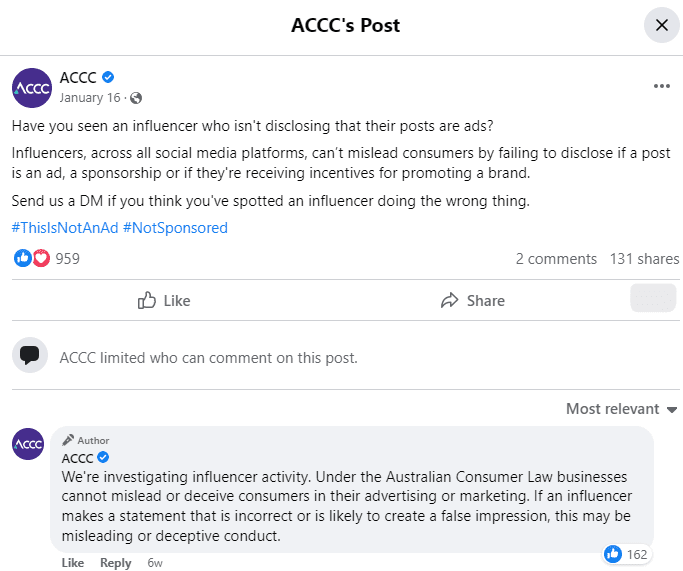The ACCC released its sixth interim report for the Digital Platform Services Inquiry on 28 April 2023. Included in this report were findings from the ACCC’s recent influencer sweep and information about intended next steps in relation to advertising by influencers which may mislead or deceive consumers.
We explore the ACCC’s findings in relation to influencers, what is likely to happen next, and what you can do to minimise risk in relation to any of your influencer marketing campaigns.
The ACCC influencer sweep and how it came about
Consumer and fair-trading issues relating to manipulative or deceptive advertising and marketing practices in the digital economy is an ACCC compliance and enforcement priority for 2023 / 2024, as it was for 2022 / 2023.
On 4 October 2022, the ACCC issued a media release advising that it was intending to conduct a series of internet sweeps with a focus on identifying deceptive practices in the digital marketplace. The ACCC indicated that it was considering as part of those sweeps, a sweep to identify any influencer posts that fail to clearly disclose advertising or sponsorship.
On 16 January 2023, the ACCC uploaded a series of posts to its Facebook account as follows:


In response to the ACCC’s posts to its social media accounts, the ACCC advised in a media release that over 150 tip-offs were received from the public.
On 27 January 2023, the ACCC announced that it was intending to conduct a sweep of influencer posts to identify misleading testimonials and endorsements by social media influencers. The ACCC conducted its influencer sweep between 23 January 2023 and 3 February 2023.
The ACCC confirmed that the public tip-offs had been incorporated into the sweep process and that the sweep included both prominent Australian influencers with large followings, as well as influencers with smaller followings.
118 influencers were monitored through their social media accounts by the ACCC for potentially misleading advertising. This wasn’t just on Instagram and TikTok, but also Snapchat, YouTube, Facebook and Twitch. The sweep focused on fashion, beauty and cosmetics, food and beverage, travel and lifestyle, health fitness and wellbeing, and gaming and technology businesses.
The ACCC advised in its report that its sweep aimed to identify examples of ways in which influencer marketing industry participants (including influencers, advertisers and brands) may use social media advertising to mislead or deceive consumers, including by:
- making incorrect statements or creating a false or misleading impression about a product, service or brand;
- omitting key information in the post, such as commercial relationships, sponsorships or other incentives; and/or
- disclosing the advertising or sponsorships, but not clearly or prominently enough for the ordinary consumer to notice or pay attention to.
Findings from the ACCC's influencer sweep
The ACCC identified in its report that a total of 81% of the influencer posts they were monitoring were concerning and in need of follow-up action, particularly in relation to ad disclosure, as they considered that the influencers’ posts showed some signs that the posts may be advertising or that the influencers may have received incentives to promote brands, but they considered that this had not been properly disclosed in the posts.
The ACCC’s concerns centred around not just posts which failed to make any disclosure of commercial relationships, but also posts which failed to clearly and prominently disclose those commercial relationships. This included burying disclosures such as #ad within lengthy captions such that their audience would have to select “click more” on posts to look for a disclosure.
Of the industries and accounts monitored, the ACCC identified the most concerns in relation to posts advertising the fashion, home and parenting and travel industries.
What is likely to happen next?
It is expected that there will be a second phase to the influencer sweep where the ACCC will conduct further assessments of the posts in relation to both advertising disclosure, and other deceptive conduct identified during the sweep.
We also await another short report to be released in relation to the specific influencer sweep results outside of that contained within the sixth interim report.
The ACCC has warned that various education, compliance and potential enforcement activities will also be conducted by the ACCC based on issues identified from the sweep.
A breach of the Australian Consumer Law provisions can result in damages, injunctions, publication orders and other remedial orders. Pecuniary penalties, fines and infringement notices can also apply for a breach of section 29 of the Australian Consumer Law, which relates to making false or misleading statements about goods or services, and which may occur in relation to influencer posts.
Pecuniary penalties in relation to section 29 were increased from 10 November 2022. A body corporate is now punishable on conviction by a fine of not more than the greater of the following:
- $50,000,000;
- if the court can determine the value of the benefit that the body corporate, and any body corporate related to the body corporate, have obtained directly or indirectly and that is reasonably attributable to the commission of the offence—3 times the value of that benefit;
- if the court cannot determine the value of that benefit—30% of the body corporate’s adjusted turnover during the breach turnover period for the offence.
An offence by a person other than a body corporate is punishable on conviction by a fine of not more than $2,500,000.
The ACCC also confirmed in its report that further industry engagement and guidance to improve compliance will also follow which will target not only individual influencers but also brands, advertisers, marketing firms and social media platforms in facilitating any misconduct.
We have already seen recent examples of the ACCC taking steps to engage with industry. On 13 April 2023, the ACCC presented a preview of its findings in relation to the influencer sweep exclusively to members of the AANA and AiMCO. Our Tegan Boorman hosted this session on behalf of AiMCO alongside Megan McEwin from the AANA.
Influencers and unfair contract terms warning
The report also highlighted the issue that unfair contract terms laws may apply in some instances to influencer contracts with both brands and talent agencies. It’s important to note that unfair contract terms in consumer and small business contracts is also an enforcement and compliance priority for the ACCC in 2023 / 2024.
Now would be a good time to conduct a legal review of your influencer agreements to ensure that they do not contain any unfair contract terms. From 9 November 2023, a court will, for the first time, be able to impose penalties for the inclusion of unfair contract terms into consumer or small business standard form contracts.
The maximum pecuniary penalties that will be able to be ordered once the new provisions come into effect are the greater of:
- $50,000,000;
- if the court can determine the value of the benefit that the body corporate, and any body corporate related to the body corporate, have obtained directly or indirectly and that is reasonably attributable to the act or omission–3 times the value of that benefit;
- if the court cannot determine the value of that benefit–30% of the body corporate’s adjusted turnover during the breach turnover period for the act or omission.
It is also important to note that a person who contravenes the relevant section of the Australian Consumer Law commits a separate contravention of that subsection in respect of each term that is unfair and that the person proposed.
Action by other regulators in relation to influencers
The report also discusses some of the recent actions taken by other regulators, such as the TGA, ASIC, AHPRA and the ATO in relation to influencers. We have discussed action by some of these other regulators here and here.
Our Tegan Boorman has also hosted and served as a panellist on a number of AiMCO webinars discussing these developments.
Other issues identified in connection with influencers
The ACCC report highlighted other issues relating to influencers surrounding:
- online harassment of influencers and how it can be reported, noting the eSafety Guide by the eSafety Commissioner;
- children as influencers – noting the current lack of protections for young Australian content creators;
- a lack of understanding and consensus about the standards for determining pay rates between influencers and brands, as well as a lack of transparency regarding remuneration in the industry – noting that this has led to people accepting lower remuneration;
- an imbalance in power between talent agencies, brands and influencers and a rapid expansion of the industry – noting that disparities in the quality of service and support, and issues relating to unfair contracts is able to occur;
- how an influencer’s remuneration can be affected by changing algorithms on the platforms, and how this can have a considerable impact on an influencer’s ability to reach their followers and earn revenue.
Steps you can take to minimise your risk associated with your influencer campaigns
There are a number of steps that you can take now to ensure that you are staying on the right side of the law when it comes to your influencer marketing campaigns. These include:
- Checking your ad disclosure – advertising disclosure on influencer posts should always be “above the fold”, meaning that you can easily view that disclosure quickly and easily without having to select “click more”. The easiest way to ensure this is achieved, as well as to meet your obligations under the relevant platform terms and conditions, is to use the branded content tools available on the platform;
- Check your influencer agreements – you’re specifically looking for any unfair contract terms as well as obligations in relation to ad disclosure, other rights and obligations to protect the parties in relation to breaches of the Australian consumer law, as well as rights and obligations to protect the parties from breaches of other laws specific to the goods and services advertised, such for example, therapeutic goods;
- Audit your influencer content – you’re looking for breaches of the law and / or breaches of your influencer agreements. If you identify any breaches, it’s a good idea to speak with a lawyer about those breaches to determine appropriate next steps to take;
- Seek advice – it’s a good idea to seek advice to assist you with the above steps and to understand any gaps in your knowledge when it comes to legal obligations in connection with your influencer marketing campaigns. We can assist you with this advice.
Proposed law reform
The ACCC continues to make a series of recommendations in relation to law reform and the introduction of various measures and codes to address the issues they have identified as part of the Digital Platform Services Inquiry. These are detailed in the report and can be viewed from pages 17-18.
For advice in relation to legal issues associated with your influencer marketing campaign, contact us.
Information contained within this blog post is intended to be general information only and is not in any way intended to constitute legal advice. You should not act or rely on any information found in this blog post without obtaining prior advice specific to your circumstances.




